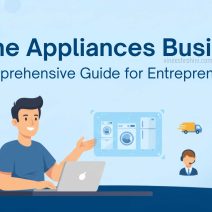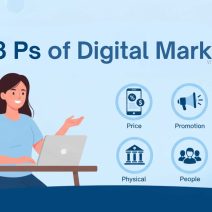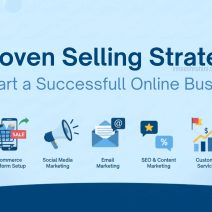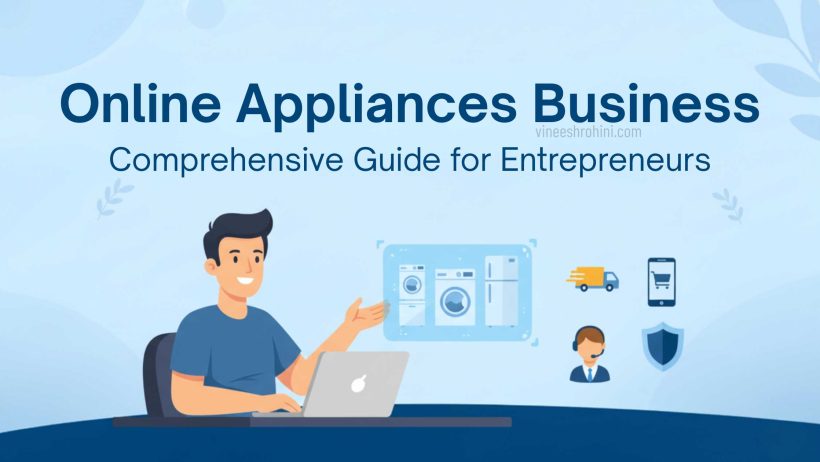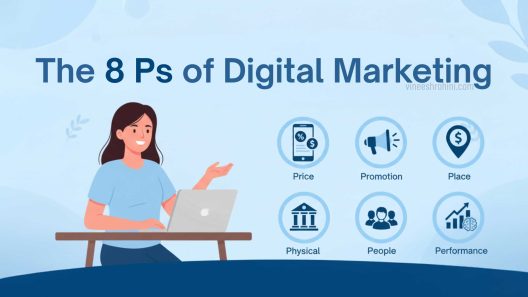Online Appliances Business : The world of eCommerce is evolving faster than ever, and one of the most profitable sectors in this transformation is the online appliances business. From kitchen gadgets and home essentials to smart appliances and eco-friendly innovations, online sales for appliances in India and globally are experiencing exponential growth. With the convenience of doorstep delivery, flexible payment options, and an increasing preference for online shopping, more consumers are buying appliances through eCommerce stores instead of physical outlets.
Table of Contents
If you’re considering entering this booming market, now is the perfect time. However, building a successful online appliances business requires careful planning, strategic execution, and the right technology. This comprehensive 3000-word guide explains everything you need to know — from market analysis and business setup to branding, logistics, and digital marketing — to help you launch and scale your online appliances store in 2025.
1. Understanding the Online Appliances Industry

The appliances market includes a wide range of products — from basic home tools to advanced smart devices powered by AI and IoT. The global home appliances market is expected to surpass $600 billion by 2025, with India contributing significantly due to its growing middle class and digital adoption.
Key growth drivers include:
- Increasing online penetration and digital literacy.
- Growth of smart home devices and connected appliances.
- Rising disposable income and consumer lifestyle upgrades.
- Expanding logistics and delivery infrastructure.
- Availability of easy financing options and EMIs.
In India, eCommerce giants like Flipkart, Amazon, Croma, and Reliance Digital have set high standards for online appliance retailing. However, new entrepreneurs have immense opportunities to target niche markets — such as eco-friendly appliances, small-space solutions, and affordable smart home products.
Also Read : 10 Proven Selling Strategies to Start a Successful Online Business : A Comprehensive Guide 2025
2. Choosing Your Niche and Product Line
The appliances category is vast, and selecting a niche helps you focus your marketing and operations. Choosing the right product range ensures better audience targeting, efficient inventory management, and higher profits.
Popular online appliance niches include:
- Kitchen Appliances: Mixers, microwaves, induction cooktops, blenders, toasters, and air fryers.
- Home Appliances: Washing machines, vacuum cleaners, fans, air conditioners, and heaters.
- Smart Appliances: IoT-powered devices such as smart thermostats, Wi-Fi-enabled lights, or smart speakers.
- Eco-Friendly Appliances: Solar-powered chargers, energy-efficient fans, and low-power refrigerators.
- Personal Appliances: Hair dryers, electric shavers, grooming kits, and steamers.
- Office and Utility Appliances: Coffee makers, air purifiers, and compact mini-refrigerators for workplaces.
Pro Tip: Start with a focused niche — for example, “modern kitchen essentials” or “smart lifestyle appliances” — then expand your product categories as your brand grows.
3. Conducting Market Research
Market research is the foundation of every successful business. It helps you identify your audience, assess competitors, and predict consumer trends.
Steps to perform effective research:
- Analyze customer behavior: Understand what types of appliances are trending and why customers buy them online instead of offline.
- Study competitors: Check platforms like Amazon, Croma, and niche appliance stores for product ideas, pricing, and marketing strategies.
- Understand market gaps: Identify appliances or customer segments that are underserved.
- Leverage online tools: Use G Trends, SEMrush, and Statista for data insights.
Example: If you notice that customers often complain about the lack of affordable smart home products, you can position your brand as a budget-friendly smart appliance provider.
4. Business Model Selection

Your business model determines how you’ll sell your appliances and make profits. Each model has advantages depending on your investment capacity and operational control.
Common business models for online appliances:
- Inventory-Based Model:
You purchase and store products before selling them.
- Pros: Higher profit margins and quality control.
- Cons: Requires capital investment and storage space.
- Dropshipping Model:
You don’t hold inventory. When a customer places an order, your supplier ships directly.
- Pros: Low startup cost, minimal risk.
- Cons: Less control over quality and shipping times.
- Marketplace Model:
You create a platform for multiple sellers to list their appliances.
- Pros: Scalable and diverse product offerings.
- Cons: Complex management and higher tech investment.
- Affiliate Marketing Model:
You earn commissions by promoting appliances from other brands or marketplaces.
- Pros: No inventory or logistics required.
- Cons: Lower revenue potential compared to direct selling.
Pro Tip: For new entrepreneurs, dropshipping or hybrid inventory models are ideal to start without heavy investments.
5. Building Your Online Store
Your online store is your brand’s digital showroom. It should combine attractive design, seamless user experience, and mobile responsiveness.
Steps to create a professional store:
- Select a platform: Use eCommerce solutions like Shopify, WooCommerce, or Wix for simplicity and scalability.
- Purchase a domain and hosting: Choose a name that’s memorable, easy to spell, and relevant to your products.
- Design your website: Include clear product categories, search filters, and a minimal yet professional layout.
- Add product listings: Use high-quality photos, detailed specifications, user manuals, and descriptive content.
- Enable secure checkout: Integrate payment gateways such as Razorpay, PayU, or Stripe.
- Optimize for SEO: Include relevant keywords like “best kitchen appliances in India” or “buy smart home gadgets online”.
Essential website pages:
- Home
- Product Categories
- About Us
- Shipping & Returns Policy
- Contact Page
- Blog/Resources Section
Pro Tip: Use professional product photography — appliances sell best when customers can visualize them in real-life environments.
6. Establishing Supplier and Logistics Partnerships

In an online appliances business, suppliers and logistics partners play a major role in ensuring consistent product quality and timely deliveries.
Choosing suppliers:
- Connect with trusted manufacturers via IndiaMART, TradeIndia, Alibaba, or local distributors.
- Request product samples before listing.
- Negotiate for wholesale rates and volume discounts.
Choosing logistics partners:
- Collaborate with companies like Shiprocket, Delhivery, or BlueDart for domestic shipping.
- For larger appliances, ensure they offer fragile handling and insurance coverage.
- Integrate order tracking directly into your website.
Pro Tip: Building long-term supplier relationships can help secure exclusive deals and faster restocking.
7. Marketing Your Online Appliances Store
Digital marketing is the driving force behind your business growth. You need to attract the right audience, convert them into buyers, and retain them for repeat purchases.
Best digital marketing strategies for appliances business:
- Search Engine Optimization (SEO):
Optimize your website for keywords like “affordable kitchen appliances,” “smart home gadgets,” or “top washing machines online.”
- Use blog posts, comparison guides, and review content to rank organically.
- Pay-Per-Click (PPC) Advertising:
Run G Ads and Meta Ads targeting product-specific keywords and customer segments. - Social Media Marketing:
Leverage platforms like Insta, YT, and FB to showcase appliances in use. Create product demos, unboxing videos, and customer testimonials. - Email Marketing:
Send newsletters, promotional offers, and product updates using tools like Mailchimp or Klaviyo. - Affiliate and Influencer Marketing:
Partner with tech influencers and homemakers who can review and promote your appliances. - Content Marketing:
Build authority by writing about appliance maintenance, energy-saving tips, and product comparisons.
Pro Tip: Highlight eco-friendliness, energy efficiency, and after-sales service — these are strong selling points for modern consumers.
8. Setting Up Customer Support and After-Sales Service

Customer satisfaction defines the long-term success of an appliance brand. Appliances are high-value purchases, so customers expect post-sale support.
Key support essentials:
- Provide chatbots and live support using tools like Tidio or Freshdesk.
- Create detailed FAQs and user guides on your website.
- Offer hassle-free returns and replacements.
- Partner with service centers or technicians for repairs.
- Collect feedback regularly to improve operations.
Pro Tip: Exceptional after-sales support can turn a first-time buyer into a lifelong customer.
9. Analyzing Data and Optimizing Performance
Once your store is operational, tracking data is vital to ensure growth and profitability.
Important metrics to monitor:
- Website Traffic: Using G Analytics 4 and Search Console.
- Conversion Rates: Percentage of visitors making a purchase.
- Cart Abandonment Rate: Identify drop-off points during checkout.
- Customer Lifetime Value (CLV): Revenue generated per customer over time.
- Return Rate: Helps identify quality or delivery issues.
Pro Tip: Use insights from analytics to tweak your marketing, improve UX, and refine product offerings regularly.
10. Scaling Your Business

Once your online appliances business achieves consistent sales, focus on scaling to new heights.
Ways to scale your business:
- Expand product categories: Introduce complementary items such as smart lighting or furniture accessories.
- Go international: Use global platforms like eBay or Amazon Global Selling.
- Invest in automation: Use CRM tools and AI-based systems for marketing and inventory management.
- Offer installation services: Add value by including setup or extended warranties.
- Build a mobile app: For convenience and customer loyalty.
Pro Tip: Reinvest your profits into advertising, team building, and technological improvements. Scaling smartly ensures sustainable long-term growth.
Buy Now : Launch Your Ecommerce Business – From Start to Success
Challenges in the Online Appliances Business
While profitable, this industry has its share of challenges. Being aware helps you plan better:
- High logistics costs for heavy items.
- Frequent product returns or damage issues.
- Need for strong customer support systems.
- Intense price competition from large marketplaces.
Solutions:
- Focus on niche appliances with less competition.
- Partner with reliable courier services.
- Offer warranty and quality certifications.
- Build brand trust through excellent service and content marketing.
Conclusion
Starting an online appliances business in 2025 is a smart opportunity for entrepreneurs who want to tap into India’s rapidly expanding eCommerce sector. With proper niche selection, strong supplier relationships, efficient logistics, and an effective marketing strategy, you can build a successful, scalable, and customer-centric brand.
Remember, success doesn’t come overnight. Focus on quality, consistency, and customer trust — these are your most valuable assets in a competitive marketplace. As digital transformation continues, those who combine innovation with customer value will lead the next wave of online appliance businesses.
Disclaimer
This article is for informational and educational purposes only. It should not be considered business, legal, or financial advice. Readers are encouraged to conduct independent research or consult professionals before starting or investing in an online business.
